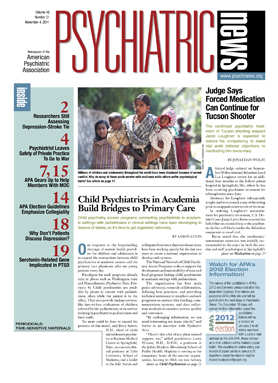A new study delving into the relationship between depression and stroke finds a positive association between the two conditions, confirming the results of earlier research and pointing to a need for future studies that can lead to a better understanding of how these disorders are connected.
Featured in the September 21 Journal of the American Medical Association, the meta-analysis and statistical review pooled data from 28 prospective cohort studies on the link between depression and the future risk of stroke among adults aged 18 and older. An Pan, Ph.D., of the Harvard School of Public Health and colleagues conducted the evaluation.
The set of studies selected for review contained information on 8,478 cases of stroke morbidity and mortality among more than 315,000 noninstitutionalized individuals. Each study compared the stroke risk of depressed individuals with that of participants without depression.
For the purposes of the meta-analysis, the researchers collected data on participants' baseline depression status and any subsequent occurrence of stroke, as well as on the varying methodologies of the earlier studies. The majority of the studies used self-reporting scales to assess the presence of depression, while stroke figures were primarily gleaned from medical records and death certificates. Data on the treatment of depression were unavailable for most of the studies.
The researchers noted that one-half of the studies included in the meta-analysis showed a "statistically significant" connection between depression and an increased risk of total stroke, fatal stroke, and ischemic stroke. (Only two of the 28 studies included data on hemorrhagic stroke, leading the researchers to call for further research into the link between depression and this form of cerebrovascular accident.)
In extrapolating the risk estimates determined through their analysis, Pan and colleagues estimated that depression is likely a contributing factor in 3.9 percent of the strokes occurring in the United States.
While the present study did not explore the reasons for the underlying connections between the two disorders, the researchers proposed several ways in which suffering from the severe mental illness may influence the likelihood of experiencing a stroke. These included depression's neuroendocrine and immunological/inflammation effects, the lack of attention to maintaining good physical health that is often associated with depressed individuals, and the presence of such comorbid illnesses as diabetes and hypertension.
Robert Robinson, M.D., head of the University of Iowa's Department of Psychiatry, told Psychiatric News that four earlier studies that focused on the presence of depression subsequent to suffering a stroke showed that the mental illness hinders recovery and approximately doubles the mortality rate for up to 10 years.
"Given these earlier findings, the results of this new study are not as surprising as they are notable for raising the question of what links depression and stroke," said Robinson. "The mechanism of depression leading to stroke may be the same as that causing increased death or impaired physical and cognitive recovery among those with depression following stroke."
The researchers acknowledged several limitations of their meta-analysis. For example, the analysis was limited to studies published in English, and the majority of studies lacked information on how or if those with depression were being treated for the disorder.
The study was supported by grants from the National Institutes of Health.

